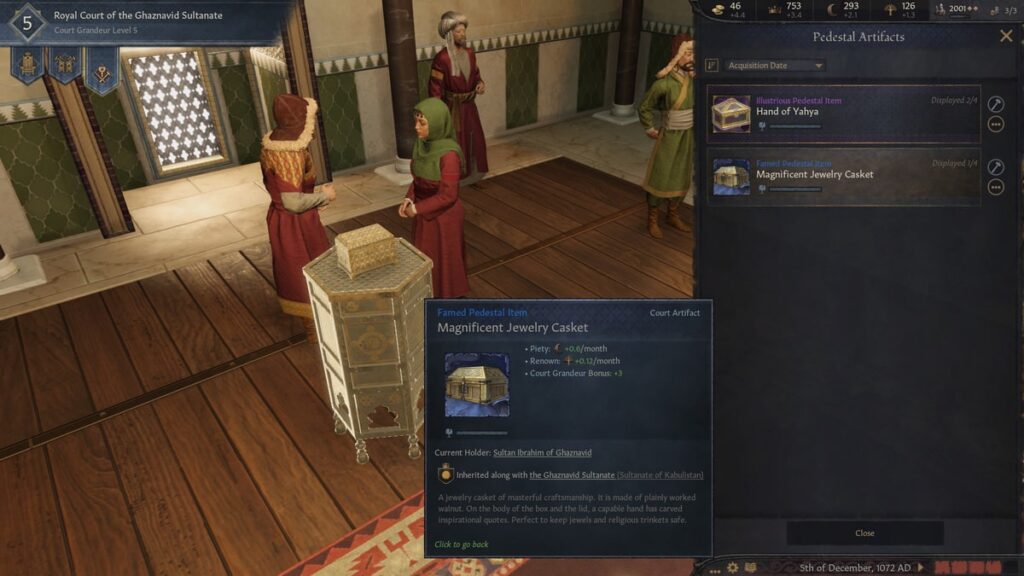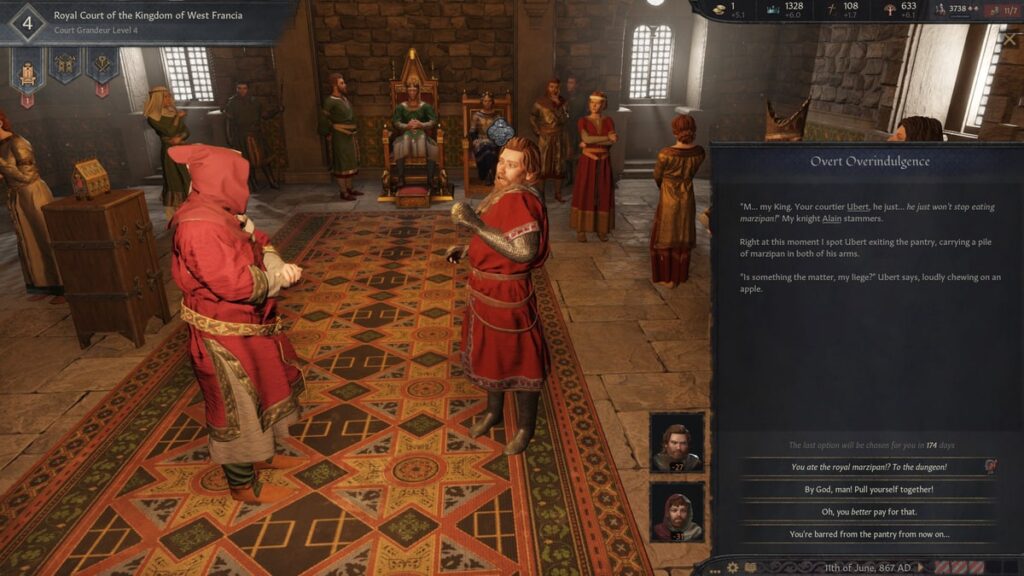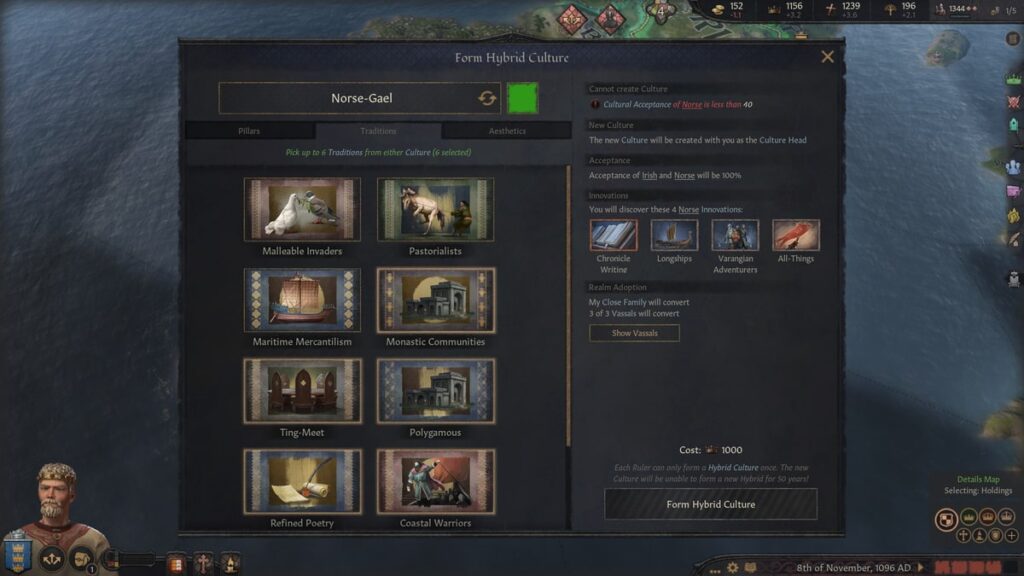It’s an image ripped out of TV and cinema; a ruler sitting on their throne, their courtiers and advisors around them as someone grovels by their feet for clemency or support in a matter that’s ordinarily a million miles away from what their king would be concerned with. While Crusader Kings has always been great at evoking many of these kinds of personal stories through its role playing elements in the past, the Royal Court expansion goes the whole 3D rendered hog to more actively resemble its inspirations.
By far and away the flashiest new feature is the royal court that gives the expansion its name. This leans in hard on all the work that Paradox Interactive did creating 3D avatars for all of the characters in-game and presents them in a rendered realisation of your court. Here your ruler sits on their throne, their spouse by their side, advisors and nobles milling around, and with as much finery as you can gather to show off your resplendent stature.
Any ruler would want to have the most impressive court in all the known lands, and to that end you want to build up your Court Grandeur level. You can do this in a few ways, the main one being simply funnelling money in to make the place look fancy. Choose how flamboyant you want your attendees’ fashion to be, how fancy the food is, how many servants are running around. This will cost you gold every month and requires persistence as it takes time for your perceived grandeur to meet the level that you’re paying for. It’s worth it for some of the bonuses that higher level courts offer, from lowering the Tyranny of your actions, to courtiers gaining special traits and more.

You can also boost it by displaying various artefacts and banners in your throne room just to show off. It could be that you grabbed an artefact while crusading (there’s some unique historical artefacts to be found), bought it at the market, or you sponsored someone who was inspired to create it. This goes hand in hand with the personal inventory of your character, able to equip crowns, weapons, armour and all manner of trinkets. With care from an Antiquarian, these things can be passed down to your heir, their historical ownership tracked like a kind of physical real world NFT.
The court feeds the constant need of Crusader Kings 3 to present you with new narrative moments, both serious and absurd. These can crop up naturally, as guests to your court seek money to feed creative endeavours, which can in turn increase the stature of your court, and your courtiers have smaller encounters, like your granddaughter painting on the floor or one of your knights being outed for stealing marzipan from the kitchen! Every five years, you can hold court, flinging open the doors to all and sundry to air the petty internal arguments of your realm. Peasants will implore you to overrule their lord, neighbouring towns will bicker over land rights, men driven mad by your warlike tendencies will come to challenge you personally. Do you think you can take them in one on one combat, have him executed or simply get him thrown out? The choice is yours.

It’s great fodder for the player-led storytelling of the game and it adds a more visual aspect to the game’s storytelling, but those who actually get to have a court is fairly restricted. Royal courts are the preserve of feudal and clan governments and then only for the overarching ruler of a kingdom – though you can petition your liege in their court for certain things. Fancy yourself to be important enough as a petty king in Ireland? Well, the game says otherwise and demands that you become the ruler of a defined kingdom first. That’s all well and good to say, but actually doing that is likely to be the task of multiple generations as you expand, conquer and manoeuvre your way to the specific titles that you can pass down from player character to heir. It keeps the royal court feeling like a special mechanic that you earn, but it does mean that there are some large regions where this mechanic simply doesn’t apply. If you want to experience it (and you probably will considering the DLC’s $30 price tag) you can always simply hop into the body of an eligible ruler and kingdom right from the off.
Whether or not you have the 3D representation of a court, everyone (and I mean everyone, because this is part of the free update) will have a litany of court positions that they can fill. This goes far beyond the six positions on your Council, and allows for some other positions of prestige to be shared around. Some of these are quite generalised, such as the Court Physician, which is now more prominently represented, Antiquarian to care for your collected artefacts and a Court Tutor to aid your offspring in their education, but there’s also more unusual things like the Keeper of an Swans for an English monarch.
You can’t just throw them around without consideration, as you obviously want to have someone qualified for a role to fill it, and there’s a small monthly salary attached. You probably want to put someone you implicitly trust in the role of Bodyguard and Food Taster, for example. Add a little spite into the mix when choosing your Jester. As with the Council, if you replace someone, they’ll have their nose put out of joint and you’ll lose some Prestige for your troubles.
No less impactful are the changes, or rather the expansion of the cultural systems within Crusader Kings 3, adding the same kind of flexibility that the main game’s release did for religion. Royal Court lets you reform, diverge and hybridise cultures. In the latter, you can pick and choose from the core Pillars of each culture, the language, and then go on to mix and match Traditions that can give you powerful buffs to further your chosen playstyle – Malleable Invaders will be better at pushing for cultural hybrids, as just one example.

As always, you can’t just do this willy-nilly and it requires cultural acceptance, but it’s a powerful tool if you find yourself in the right spot to do so, and represents the real ways that cultures merged and morphed as various influences (often invasions) were felt through the era. You can absolutely help your cause when trying to make friends and influence people by pursuing the Learn Language scheme as a ruler (or getting their potential heirs to learn a second language) which cuts deeply into any cultural penalties you might face with a neighbour of a different background. As the ruler, the Learn Language scheme throws up plenty of fun little narrative moments that are great to see, even at the risk of your stress level jumping up.
Royal Court is a pricey expansion, but it helps Crusader Kings 3 take another step toward representing that Game of Thones-ian medieval ruler fantasy. Alongside that the cultural hybridisation and divergence also mean it’s building out the foundations of the actual grand strategy in intriguing ways for the game’s future.
- 3d
- advisors
- All
- Another
- arguments
- around
- body
- Bonuses
- build
- Building
- care
- Cause
- challenge
- cinema
- Council
- Court
- Courts
- Creating
- Creative
- crop
- Culture
- DID
- different
- down
- driven
- Education
- endeavours
- English
- Expand
- expansion
- experience
- Face
- FANTASY
- Fashion
- Feature
- Feet
- First
- Flexibility
- food
- Free
- fun
- future
- game
- Gold
- good
- Governments
- great
- here
- hold
- How
- HTTPS
- Hybrids
- i
- image
- important
- Increase
- influence
- interactive
- inventory
- ireland
- IT
- King
- language
- large
- LEARN
- Level
- Market
- Match
- Men
- million
- money
- more
- new feature
- NFT
- Nose
- offer
- open
- Other
- Ownership
- painting
- People
- persistence
- petition
- physical
- physician
- player
- Playing
- Plenty
- potential
- powerful
- present
- price
- qualified
- RE
- real world
- release
- religion
- representation
- requires
- Risk
- running
- s
- Salary
- shared
- SIX
- small
- smaller
- So
- Sponsored
- Spot
- Stories
- storytelling
- Strategy
- stress
- support
- Systems
- The
- Through
- time
- Trust
- tv
- unique
- unusual
- Update
- What
- WHO
- within
- Work
- world
- worth
- years
- youtube











